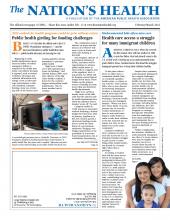
The U.S. needs to invest more in science and technology to regain leadership, a report says.
Photo courtesy AnaStills, iStockphoto
A new national strategy is needed to revitalize America’s role as a worldwide leader in science and technology, according to a new report.
In “State of Science in America,” released in December, U.S. workers across five key sectors shared concerns about the country’s science and technology leadership and called for greater investments in the fields.
A majority of workers and experts surveyed for the report — more than 75% — said the U.S. is losing or has already lost the race for global leadership in science and technology, with 60% of responders predicting that China will assume the lead role within five years.
The report, a project of the nonpartisan Science and Technology Action Committee, surveyed nearly 2,000 Americans working in five sectors: health care; K-12 education; business; military and national security; and the science, technology, engineering and mathematics fields.
“As new threats to our national security and economy arise, strong federal leadership on science and technology is essential,” said Keith Yamamoto, PhD, president of the American Association for the Advancement of Science and a co-chair of the Science and Technology Action Committee, which comprises 25 nonprofit, academic, foundation and corporate leaders.
Among the report’s findings, nearly 70% of survey participants said government investments in science and technology should be protected from budget cuts, including 86% of respondents who identified as Democrats and 55% who described themselves as Republicans. Also, more than 40% said the federal government is primarily responsible for the strength of U.S. science and technology fields.
Almost 80% of respondents, including a majority of Democrats and Republicans, said they were concerned about public distrust in science, and respondents in all five sectors said quality K-12 education is key to the nation’s future scientific advancements.
The report also offered policy recommendations, calling for a comprehensive, national strategy for advancing science and technology in the U.S. and bolstered federal investments. In particular, the report supports increasing federal funding for science and technology from less than 1% of the U.S. gross domestic product to at least 1.4% in the next five years.
Other recommendations include strengthening K-12 STEM education, ensuring a diverse STEM workforce, and partnering with other nations on global science and technology challenges.
“Strengthening science and technology in the United States will allow our nation to effectively participate in the next scientific renaissance that is now emerging on a global scale,” said committee member Georges Benjamin, MD, APHA executive director, in a news release.
For more information on the report, visit www.sciencetechaction.org.
- Copyright The Nation’s Health, American Public Health Association









